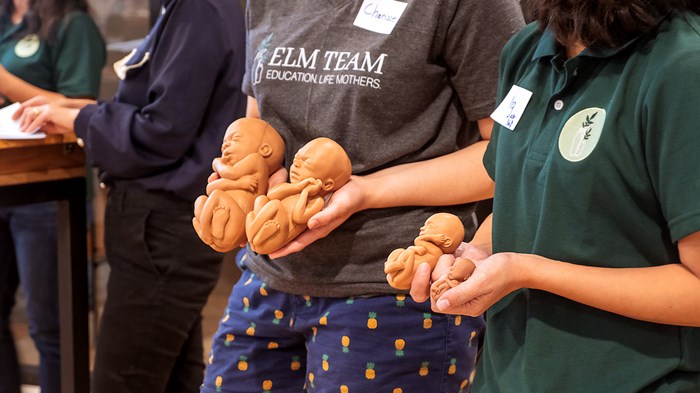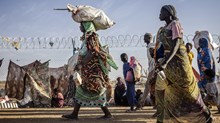
Starting today, abortions are legal in Thailand up to 20 weeks, an extension of the current 12-week limit. It’s a stark turnaround in the Buddhist-majority country, which until February 2020 banned abortions with some exceptions.
That’s when Thailand’s Constitutional Court struck down the statutes in its criminal code that had imposed fines and prison terms for those who perform or receive an illegal abortion, declaring the law to be unconstitutional. As a result, the Thai parliament passed the 12-week abortion law last year.
The Southeast Asian nation’s abortion restrictions have historically been stricter than much of the rest of the world as Theravada Buddhists (which make up more than 90 percent of the population) believe abortion is a sin that violates the first Buddhist precept forbidding the killing of any living thing.
Yet the shame in Thai society surrounding unwed mothers and teen pregnancies, as well as economic stress, has long led women to get abortions through illegal means or by claiming mental health exemptions. This month’s change in abortion regulations reveals a shift in concern from the unborn baby’s life to the mother’s situation.
Some Thai Christians and Buddhists are speaking out against the new abortion law, citing a common concern about the sanctity of life. They are also working at the grassroots level to prevent abortions by providing sex education and pushing for greater government aid for single mothers. Several Christian ministries work to counsel women who experience unplanned pregnancies as well as those who have already had abortions.
As abortion remains a taboo topic, Thai society lacks a united movement. Yet Katie Miller, director of the Education, Life, Mothers (ELM) Team, a pregnancy center in northern Thailand, noted, “We are quietly equipping and empowering women to know how to choose life in Thailand.”
Statutes and shame in modern Siam
Before the Constitutional Court ruling, abortions were illegal except in cases of rape, incest, pregnancies of women under the age of 15, fetal impairment, or harm to the mother. Any woman who underwent an illegal abortion could be imprisoned for up to three years, while anyone who performed an abortion could spend up to five years in prison.
In practice, Thai doctors gave a broad interpretation as to what constituted harm to the mother, including harm to her mental health, according to a 2018 report by the World Health Organization’s Southeast Asia office. The report noted that about 30,000 abortions take place in public hospitals each year.
Yet most abortions in Thailand are done in private-sector facilities or unmarked abortion clinics, or they are self-administered. The WHO report estimated that, in total, between 300,000 and 400,000 abortions occur every year in Thailand.
While most Buddhists would consider abortion to be against the first of the five Buddhist precepts, Thai society operates within an honor-shame mentality, sources noted. If a young girl gets pregnant, her parents will often pressure her into quietly having an abortion to save face with the community.
Khaisri Sirinumboontavee, 51, a social worker at a hospital in the northeastern city of Udon Thani, said that as a Buddhist, she does not want abortions to happen. “But if there is a real necessity, like a person who is pregnant and is not ready, they should have a solution and a safe alternative.”
She fears for the life of the mother who seeks out dangerous and sometimes deadly illegal abortions. Some take off-market abortion pills purchased at pharmacies. Others visit unsafe illegal clinics. According to the WHO, abortions are estimated to contribute to 10 percent of maternal deaths.
Sirinumboontavee is also concerned about women who are not yet ready to have a baby and end up abandoning, neglecting, or abusing the child. She worries it would lead to a host of other problems: “It is like dying even though they are alive. It then becomes a social issue.”
Pro-life Buddhists and Christians
Yet many Buddhists hold to a more conservative view. Phongsiri Sirisuwanjit, 61, a child rights lecturer and devout Buddhist in Chiang Mai, called the law “inappropriate” in Thai society. “Buddhists consider abortion and the killing of a child a sin,” she said. Many interpret abstaining from taking life to include abortion, suicide, murder, capital punishment, and euthanasia. Engaging in these activities brings bad karma, they believe, which will influence the status of a person’s next life.
Buddhist leaders who have spoken out about the issue include well-known monk Phra Ratchadhamanithet, who has called women who have an abortion “spoiled” as they wanted to have sex but are “not ready to take care of the child.” Bhikkhuni Dhammananda, a female monk, has said abortion is murder, which violates Buddhism, and if a woman chooses to get an abortion, she is sinning and invoking bad karma. However, she believes a woman has a right to choose but must accept the consequences of the decision.
In the minority is Phra Shine Waradhammo, a Buddhist monk who supports LGBT rights and joined 20 pro-choice activists in front of the National Assembly of Thailand in 2021 advocating for greater abortion access. He told Reuters his stance has sparked outrage among fellow Buddhists.
The Network Against Free Abortion, headed by two doctors including the president of the National Federation of Medical and Public Health Practitioners, also pointed to the Buddhist belief in the sanctity of life in a letter submitted to the Thai parliament. It outlined their opposition to the abortion law, noting it would violate the beliefs of medical professionals as well as the unborn baby’s right to life.
This is an area where Christians, which make up about 1 percent of the Thai population, share a common cause with Buddhists. Pastors Chukiat Chaiboonsri, 48, and Paponsun Eakkapun, 24, of Creation Chiang Mai Church said Christians must make it clear they disagree with the ruling.
“Thai Christians believe that God is a God who is love and [that] man has no right to destroy anyone's life or breath because God is the God who gives life and breath to man,” the pastors told CT by email.
Chaiboonsri and Eakkapun quoted Genesis 2:7 and Exodus 21:22–25 as support for God’s high value of the unborn. They have spoken to their church about the law and say it is imperative to make sure congregations across the country support the sanctity of life.
Chaiboonsri and Eakkapun believe Thai Christians must take action in their communities. One way Creation Chiang Mai does this is through youth groups. Their church’s youth group instills biblical principles, teaches about sex and purity, and helps young adults discern what laws are outside the will of God. Topics of sex and abortion are rarely discussed in Thai homes, so the pastors encourage Christian parents as well as the church to have these uncomfortable conversations.
“Every church must look to the new generation because they will grow up to be church leaders in the future,” wrote Chaiboonsri and Eakkapun.
Prevention and the love of Christ
Sirisuwanjit, who works with the Ministry of Social Development and Human Security, believes education from a young age is key to curbing the number of abortions. She hosts lectures and interactive training in schools in Chiang Mai for children and teachers about the problems teenagers face, including safe sex to prevent unwanted pregnancies.
The curriculum she uses encourages students to bring their concerns—whether bullying, suicidal thoughts, or sexual pressure—to appointed student leaders for help. Students are often more comfortable approaching other students, she said, and programs like this make it easier to address problems sooner. More serious concerns are then brought up to teachers.
“We should have a more proactive campaign to prevent abortion,” said Sirisuwanjit. “The most effective way to do this is by preventing unwanted and teenage pregnancies.”
In the case of unwanted pregnancies, she points to the need for the Ministry of Public Health and Human Security and the Department of Mental Health to provide resources for childcare and support.
Chalermkwan Chutima, 51, director of the Upstream Family and Community Learning Center, also believes education is important to prevent abortions in Thailand. Her nonprofit, which provides resources and training to parents and teachers, works to address problems at the source instead of trying to solve problems that have run a long course “downstream.”
Chutima, a former program coordinator at International Justice Mission who has written extensively on the issue of abortion in Thailand from a Thai Christian’s perspective, said the root cause of the abortion issue is complex: Sex, pregnancy, and abortion are intertwined with issues like domestic violence, a patriarchal society, and a lack of support for women. In the case of teen pregnancies, society places the blame solely on the young mother, while the father and his family do not take responsibility for the baby. Filled with shame, the mother sees abortion as the only answer.
“Although women have the choice to terminate or not terminate their pregnancy, decisions often come from social pressures shaped by patriarchal ideology,” she said.
Chutima believes that Thais—including Christians—need to work on fixing the root of the problem, while the Thai government should provide better assistance, healthcare, and protection for these mothers.
Upstream works with families to help them play an active role in talking with their children about sex to prevent pregnancies. Through the workshops, she seeks to adjust attitudes in the communities to support rather than condemn women. Temples, churches, and schools are encouraged to provide psychological and social support for pregnant women and their families.
Chutima believes that by helping “heal the wounds of the heart and spirit” of these women, Christians can display the nonjudgmental love of Christ to non-Christians. They can also show that Christians are pro-life both before and after the baby is born.
“People who have had an abortion will not feel like Christians are stigmatizing and punishing them with the law of God without understanding the assistance we are providing,” she said.
Walking with women
Groups like Samaritan’s Creations hope to do just that. The Christian nonprofit works with women in the red-light district of Bangkok and seeks to show them the love of God through discipleship, job training, education, and counseling.
Cofounder Kay Killar said that in her work, she assumes all women in the sex industry have had at least one abortion. Even when abortion was banned, “it is common knowledge among bar workers where to go to get an abortion,” said Killar, who is ethnically Thai. She and other members of the group counsel women who are facing unplanned pregnancies as well as those who have had abortions.
She sees teen pregnancy as a major driver for abortions and believes that Thais need to address the issue of teen pregnancy rather than “one outcome of teen sexual activity,” she said. “The harder issue to address is lack of parenting, especially due to poverty.”
The ELM Team also seeks to walk with women who see abortion as their only option. The international and local staff of the pregnancy center meet with women in crisis pregnancies and provide information about fetal development—which many are unfamiliar with—and encourage women to get ultrasounds. Miller, the ELM Team director, said that when a Buddhist woman hears her baby’s heartbeat, it helps her realize there is life within her.
The mother is paired with two staff members who come alongside her as mentors during her pregnancy and for up to two years after birth. The Christian organization also trains and equips Thai churches to share the gospel and teach fetal development curriculum in local schools and with mothers one-on-one. Miller hopes that as the pro-life message spreads, more people will come to their centers in Chiang Mai, Bangkok, and an upcoming location in Hat Yai in southern Thailand.
“I am hopeful that there will be more women who want to get involved … as a result of the ruling,” Miller said. “We must be diligent in educating about life in the womb, and then God will work to enlighten believers toward the need to stand up for the rights of these precious babies.”

Support Our Work
Subscribe to CT for less than $4.25/month


















